In recent years, FDA-approved CAR T cell therapies have changed the game in treating blood cancers. These innovative treatments use a patient’s immune system to fight cancer. They offer a personalized option for those who haven’t seen results from traditional treatments.
CAR T cell therapy modifies a patient’s T cells to target and destroy cancer cells. This technology has shown great success in trials. It has led to FDA approval for treating some types of leukemia, lymphoma, and multiple myeloma.
As research keeps moving forward, CAR T cell therapies are set to change cancer treatment even more. In this article, we’ll dive into the science behind these therapies. We’ll also look at their effectiveness, safety, and the FDA-approved options for blood cancer patients.
Introduction to CAR T Cell Therapy
CAR T cell therapy is a new way to fight cancer. It uses a patient’s immune system to attack cancer cells. This method has shown great success in treating blood cancers, giving hope to many.
What is CAR T Cell Therapy?
CAR T cell therapy is a cutting-edge treatment. It changes a patient’s immune cells to fight cancer. First, T cells are taken from the blood and changed to find and kill cancer cells.
These modified T cells are then grown in a lab. They are given back to the patient to find and destroy cancer cells.
How CAR T Cell Therapy Works
The therapy involves several steps:
- T cells are collected from the blood.
- These T cells are changed to find specific cancer cells.
- The modified T cells are grown in a lab.
- They are given back to the patient.
- They find and bind to cancer cells.
- They then kill the cancer cells.
The table below shows how CAR T cell therapy is different from traditional treatments:
| Traditional Cancer Therapies | CAR T Cell Therapy |
|---|---|
| Non-specific, targeting both healthy and cancerous cells | Highly specific, targeting only cancer cells expressing the targeted antigen |
| Often associated with severe side effects due to non-specific targeting | Potentially fewer side effects due to targeted approach |
| Limited by the development of drug resistance | Potentially able to overcome drug resistance through adaptive immune response |
CAR T cell therapy is a big step forward in cancer treatment. It offers a personalized way to fight cancer, leading to long-term remissions in some patients.
Scientists are working to use CAR T cell therapy for more cancers. This therapy has shown great promise, giving new hope to those with cancer.
The FDA Approval Process for CAR T Cell Therapies
The U.S. Food and Drug Administration (FDA) has a strict approval process for CAR T cell therapies. This ensures these treatments are safe and work well before they reach patients. The process includes preclinical studies, clinical trials, and a detailed review of how the therapy is made.
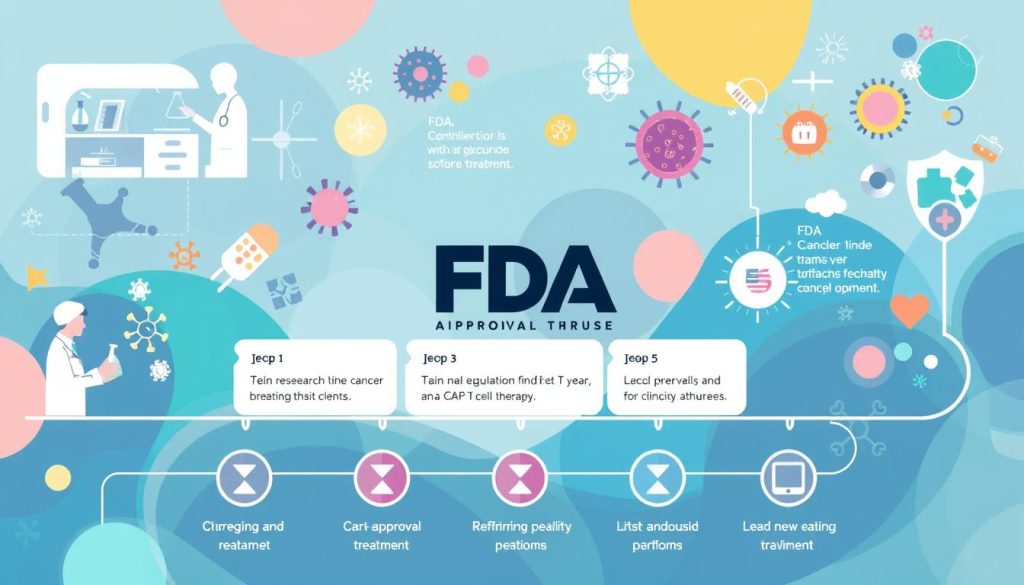
First, preclinical studies test the therapy in animals. These studies check if it’s safe and might work. If the animal tests look good, the therapy moves to human trials.
Clinical trials for fda approved car t cell therapies have three phases:
- Phase 1: Tests the therapy’s safety and best dose in a small group of people.
- Phase 2: Looks at how well the therapy works and its safety in more people.
- Phase 3: Compares the therapy to other treatments in a controlled trial.
The FDA watches the therapy’s safety and how well it works during trials. They also check how the CAR T cells are made to ensure quality.
“The FDA’s approval of CAR T cell therapies represents a significant milestone in the fight against cancer. These treatments have shown remarkable efficacy in patients who have exhausted other treatment options.” – Dr. Steven Rosenberg, Chief of Surgery at the National Cancer Institute
After trials, the maker of the therapy sends a Biologics License Application (BLA) to the FDA. The agency reviews it carefully. They check if the therapy is safe, works well, and is made right. If it’s safe and effective, the FDA approves it for use.
The FDA approval of CAR T cell therapies is a detailed process. It makes sure these treatments are safe and effective for cancer patients. As research grows, more CAR T cell therapies will go through this process. This brings hope to patients and their families.
Kymriah (tisagenlecleucel): The First FDA-Approved CAR T Cell Therapy
In August 2017, the U.S. Food and Drug Administration (FDA) approved the first CAR T cell therapy, Kymriah (tisagenlecleucel). Novartis developed this groundbreaking treatment for certain leukemia and lymphoma types. This approval was a big step in cancer immunotherapy and opened the door for more approved CAR T cell therapies.
Indications and Efficacy of Kymriah
Kymriah is for patients up to 25 years old with B-cell precursor acute lymphoblastic leukemia (ALL) that’s hard to treat or has relapsed. It’s also for adults with relapsed or refractory large B-cell lymphoma after two or more therapies. In trials, Kymriah showed great results:
- In kids and young adults with ALL, 83% achieved remission within three months.
- In adults with large B-cell lymphoma, 50% responded, with 32% getting a complete response.
Side Effects and Safety Considerations of Kymriah
While Kymriah has shown great results, it can have side effects. Common issues include:
- Cytokine release syndrome (CRS)
- Neurological toxicities
- Infections
- Prolonged cytopenias
Healthcare providers need to know how to handle CRS and neurological issues. Patients on tisagenlecleucel should be closely watched and have access to specialized care.
“The approval of Kymriah is a milestone in the shift toward treating cancer through immunotherapy and gene therapy.” – Dr. Stephen Schuster, University of Pennsylvania
Kymriah, the first FDA-approved CAR T cell therapy, has started a new era in cancer treatment. Its success has encouraged more research and development. This has led to more approved CAR T cell therapies and hope for patients with advanced blood cancers.
Yescarta (axicabtagene ciloleucel): The Second FDA-Approved CAR T Cell Therapy
After Kymriah, the FDA approved another CAR T cell therapy called Yescarta (axicabtagene ciloleucel) in October 2017. Kite Pharma, a Gilead company, developed Yescarta. It has shown great success in treating certain non-Hodgkin lymphoma types.
Indications and Efficacy of Yescarta
Yescarta is for adults with relapsed or refractory large B-cell lymphoma. This includes DLBCL, primary mediastinal large B-cell lymphoma, and high-grade B-cell lymphoma. The ZUMA-1 trial showed it had a 72% overall response rate, with 51% achieving complete response.
“The FDA approval of Yescarta is a momentous occasion for patients with relapsed or refractory large B-cell lymphoma. This CAR T cell therapy offers hope to those who have exhausted conventional treatment options.” – Dr. Frederick L. Locke, ZUMA-1 Co-Lead Investigator
Side Effects and Safety Considerations of Yescarta
Like other approved CAR T cell therapies, Yescarta can cause serious side effects. These include cytokine release syndrome (CRS) and neurological toxicities. It’s important to monitor and manage these side effects quickly for patient safety.
The most common side effects in trials were fever, CRS, encephalopathy, hypotension, and fatigue. Healthcare providers need training in managing Yescarta-related side effects. They must have access to necessary supportive care. Patients should be closely watched for at least four weeks after infusion.
Tecartus (brexucabtagene autoleucel): FDA-Approved for Mantle Cell Lymphoma
In July 2020, the FDA approved Tecartus (brexucabtagene autoleucel) for treating adult patients with relapsed or refractory mantle cell lymphoma (MCL). It’s the first CAR T cell therapy made for MCL, a rare and aggressive lymphoma type.
The ZUMA-2 trial showed Tecartus’s effectiveness. It involved 74 patients with MCL. The trial found an 87% overall response rate, with 62% achieving complete response. The median duration of response was not reached, suggesting long-lasting remissions.
Tecartus uses the patient’s T cells, which are genetically modified to target CD19 on MCL cells. After infusion, these modified T cells can kill cancer cells.
“The approval of Tecartus represents a significant milestone for patients with relapsed or refractory mantle cell lymphoma, who have limited treatment options and face a poor prognosis,” said Dr. Michael Wang, lead investigator of the ZUMA-2 trial.
While Tecartus is effective, it can cause side effects like cytokine release syndrome (CRS) and neurological issues. It’s important to closely monitor and manage these to ensure patient safety and the best outcomes.
The approval of Tecartus adds to the options for treating mantle cell lymphoma. As research improves, CAR T cell therapy looks promising for many cancers.
Breyanzi (lisocabtagene maraleucel): FDA-Approved for Large B-Cell Lymphoma
In February 2021, the FDA approved Breyanzi, a CAR T cell therapy by Bristol Myers Squibb. It’s for adults with relapsed or refractory large B-cell lymphoma. This is a big step forward in approved CAR T cell therapies for cancer.
Indications and Efficacy of Breyanzi
Breyanzi is for adults with relapsed or refractory large B-cell lymphoma. This includes DLBCL, high-grade B-cell lymphoma, and others. The TRANSCEND NHL 001 trial showed its effectiveness:
| Outcome | Results |
|---|---|
| Overall Response Rate | 73% |
| Complete Response Rate | 54% |
| Median Duration of Response | 16.7 months |
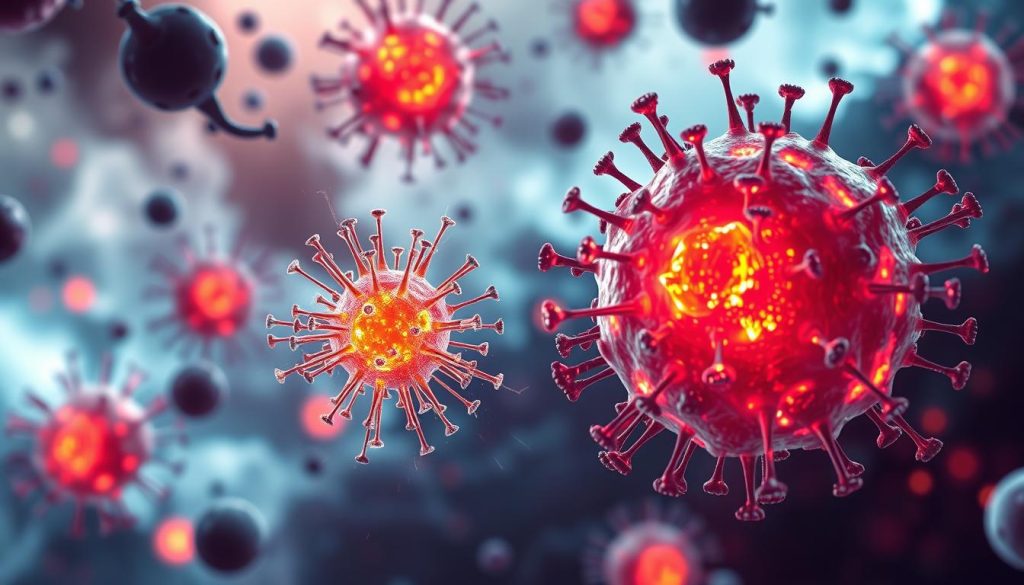
Side Effects and Safety Considerations of Breyanzi
Patients on Breyanzi may face side effects like:
- Cytokine release syndrome (CRS)
- Neurologic toxicities
- Hypogammaglobulinemia
- Infections
Healthcare providers should watch patients closely and offer support. Dr. Jeremy Abramson, Director of the Lymphoma Program at Massachusetts General Hospital, says:
The approval of lisocabtagene maraleucel gives patients with relapsed or refractory large B-cell lymphoma a new option. While we must watch for side effects, this therapy brings hope to those who have tried other treatments.
Abecma (idecabtagene vicleucel): FDA-Approved for Multiple Myeloma
Abecma, also known as idecabtagene vicleucel, is a new CAR T cell therapy for multiple myeloma. It brings hope to those who have tried many treatments without success.
Multiple myeloma is a tough blood cancer that harms plasma cells. These cells help fight off infections. But, in this disease, they grow out of control, hurting the bone marrow and causing pain, infections, and kidney issues.
Indications and Efficacy of Abecma
Abecma is for adults with multiple myeloma who have tried many treatments. This includes drugs that slow down the immune system and others. The therapy has shown promise in clinical trials, giving hope to those who have run out of options.
In the KarMMa study, Abecma showed great results:
- 73% of patients had a good response
- 33% had a complete response or better
- Median duration of response was 10.7 months
- Median progression-free survival was 8.8 months
These results highlight Abecma’s ability to offer lasting benefits to those with advanced multiple myeloma.
“The approval of Abecma represents a significant milestone in the treatment of multiple myeloma, providing a personalized and potentially curative approach for patients who have exhausted other therapies.” – Dr. Susan M. Slovin, Memorial Sloan Kettering Cancer Center
As more people get to try Abecma, doctors and scientists keep watching its effects. They aim to make CAR T cell therapies even better and use them to fight more cancers.
Carvykti (ciltacabtagene autoleucel): FDA-Approved for Multiple Myeloma
In February 2022, the FDA approved Carvykti (ciltacabtagene autoleucel). It’s a CAR T cell therapy made by Janssen Biotech and Legend Biotech. It’s for adults with relapsed or refractory multiple myeloma. This is a big step forward in CAR T cell therapies, giving hope to those who’ve tried other treatments.
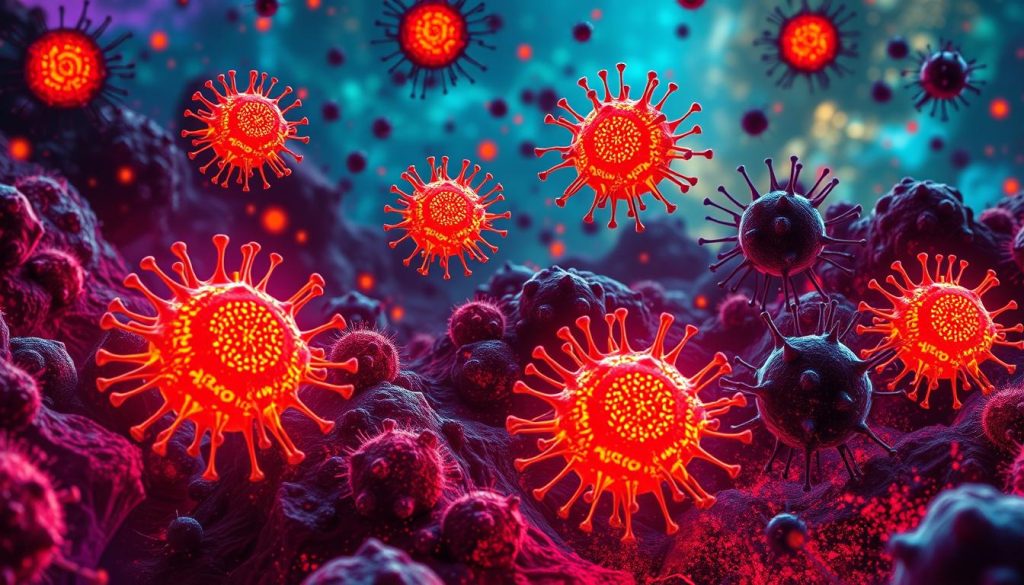
Indications and Efficacy of Carvykti
Carvykti is for patients who have tried at least four treatments. These include a proteasome inhibitor, an immunomodulatory agent, and an anti-CD38 monoclonal antibody. In the CARTITUDE-1 trial, it showed a 98% overall response rate.
78% of patients got a stringent complete response. The median duration of response was 21.8 months. The median progression-free survival was not reached, showing long-lasting results in patients with multiple myeloma.
Side Effects and Safety Considerations of Carvykti
Carvykti, like other CAR T cell therapies, can have severe side effects. These include cytokine release syndrome (CRS) and neurological toxicities. In the CARTITUDE-1 trial:
- 95% of patients experienced CRS, with 4% being grade 3 or higher
- 21% of patients experienced neurotoxicity, with 9% being grade 3 or higher
It’s important to watch for and manage these side effects closely. Healthcare providers and patients need to know the risks and precautions before using Carvykti.
The Future of CAR T Cell Therapy: Ongoing Clinical Trials and Research
The field of CAR T cell therapy is growing fast. Ongoing clinical trials and research aim to use these cancer immunotherapy drugs for more cancers. Scientists and doctors are working hard to make CAR T cell therapies better and safer for patients.
One exciting area is making personalized cancer treatments with CAR T cells. By customizing the therapy for each patient, researchers hope to boost success rates and reduce side effects. They do this by studying a patient’s cancer cells and creating CAR T cells that target those cells.
Another promising area is combining CAR T cell therapy with other treatments. This could include chemotherapy, radiation, or targeted therapies. By attacking cancer cells from different angles, these combinations might be more effective than CAR T cell therapy alone.
“The future of CAR T cell therapy is incredibly bright. With ongoing clinical trials and research, we are on the cusp of revolutionizing cancer treatment and improving outcomes for patients worldwide.”
As research advances, patients and their families have reason to be hopeful. We’re getting closer to a future where personalized cancer treatment is a reality. With each day, we’re moving towards a world where cancer is treatable, not a death sentence.
Challenges and Limitations of CAR T Cell Therapy
CAR T cell therapy has made great strides in fighting cancer. Yet, it faces many challenges and limitations. As a new cancer immunotherapy, it’s hard to make it more available and easy for patients to use.
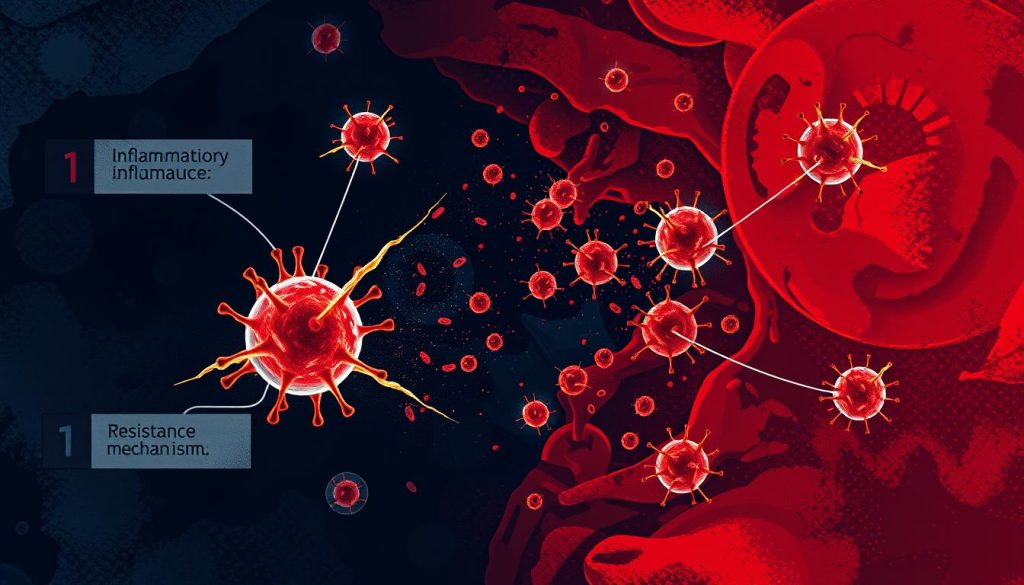
The biggest hurdle is the therapy’s high cost. Creating a treatment just for a patient is complex and expensive. This puts a huge financial strain on patients and healthcare systems. The cost of CAR T cell therapies can be hundreds of thousands of dollars, making it hard for many to get this potentially life-saving treatment.
Cost and Accessibility of CAR T Cell Therapies
The high cost of CAR T cell therapy is a big obstacle. Insurance coverage can vary, leaving some patients with big bills. Companies are working to make the treatment cheaper by improving how it’s made and increasing competition. But making CAR T cell therapy affordable and accessible is a key challenge.
Management of Side Effects and Long-Term Monitoring
Managing side effects is another big challenge. Patients may face serious reactions like cytokine release syndrome (CRS) and neurotoxicity. These can be very dangerous and need quick action from doctors.
It’s also important to keep an eye on patients long-term. The effects of CAR T cell therapy over time are not fully known. Patients need regular check-ups to see how they’re doing and to catch any new health issues.
Approved CAR T Cell Therapies: A Game-Changer in Cancer Treatment
The FDA approval of CAR T cell therapies has changed cancer treatment forever. It gives new hope to patients with certain blood cancers. These treatments use a patient’s immune system to fight cancer, making treatment more personal.
The impact of approved CAR T cell therapies is huge. Patients who ran out of other treatment options now have a chance at remission. They can also live better lives. Here’s a table showing the FDA-approved CAR T cell therapies and what they treat:
| Therapy Name | Indication | Approval Year |
|---|---|---|
| Kymriah | Acute Lymphoblastic Leukemia, Large B-cell Lymphoma | 2017 |
| Yescarta | Large B-cell Lymphoma | 2017 |
| Tecartus | Mantle Cell Lymphoma | 2020 |
| Breyanzi | Large B-cell Lymphoma | 2021 |
| Abecma | Multiple Myeloma | 2021 |
| Carvykti | Multiple Myeloma | 2022 |
The success of these FDA approved CAR T cell therapies opens doors for more research. This could lead to treating more cancers with CAR T cell therapy. More trials and new targets are on the horizon.
“CAR T cell therapy represents a major advancement in the fight against cancer. It’s a testament to the power of scientific innovation and the dedication of researchers and healthcare professionals to improve patient outcomes.” – Dr. James Wilson, Oncologist
While CAR T cell therapy faces challenges like side effects and access, its FDA approval is a big step forward. It shows the way to more effective and targeted cancer care. The future looks bright with approved CAR T cell therapies as a beacon of hope for patients and their families.
Combining CAR T Cell Therapy with Other Cancer Treatments
As research into car t cell therapy moves forward, scientists are looking to make it better. They want to mix it with other cancer treatments. This could lead to better results and help more people with cancer.
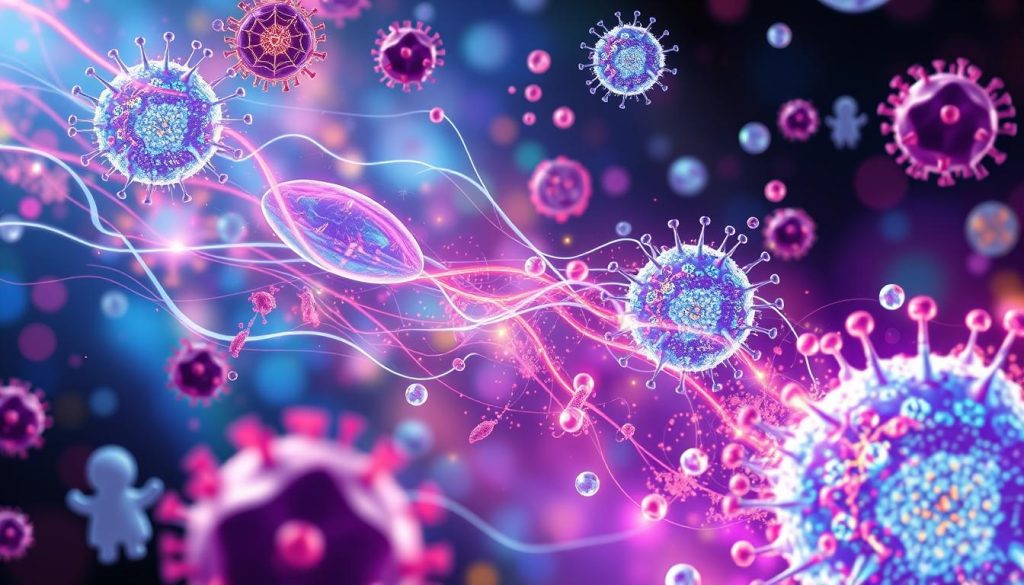
CAR T Cell Therapy and Chemotherapy
One idea is to pair car t cell therapy with chemotherapy. Chemotherapy can shrink tumors, making it easier for CAR T cells to fight cancer. Some chemotherapy drugs also help T cells work better.
Studies are checking if this mix is safe and effective. So far, it looks promising, with some patients seeing better results and longer remissions.
CAR T Cell Therapy and Radiation Therapy
Scientists are also looking at combining car t cell therapy with radiation therapy. Radiation can target tumors, helping CAR T cells work better. It might also make cancer cells easier for T cells to find and kill.
Early tests in the lab show good results. Now, it’s time to test it in people to see how it works best.
As we learn more about how these treatments work together, we’re getting closer to better cancer care. Mixing car t cell therapy with other treatments could be a big step forward.
Patient Eligibility and Selection for CAR T Cell Therapy
When looking at personalized cancer treatment like CAR T cell therapy, doctors must check each patient’s fit. Approved CAR T cell therapies have clear rules to follow. This helps make sure patients get the best care.
What makes a patient a good fit for CAR T cell therapy includes:
- Type and stage of cancer
- Previous treatments and their success
- Overall health and how well they’re doing
- Specific biomarkers or genetic changes
Doctors, including oncologists and specialists, work together to decide if CAR T cell therapy is right. They look at the patient’s medical history and do tests. This helps figure out if the therapy is a good choice.
“Choosing the right patients for CAR T cell therapy is key to its success and safety.” – Dr. Sarah Thompson, Cellular Therapy Specialist
Some patients might need extra treatments first. This could be chemotherapy to get them ready for CAR T cell therapy. Doctors also think about the patient’s support and if they can handle the treatment and aftercare.
As research grows, so do the chances for more patients. New approved CAR T cell therapies might help more people. Clinical trials are working to make CAR T cell therapy available for more cancers and at earlier stages.
The Role of Healthcare Providers in CAR T Cell Therapy
CAR T cell therapy is changing how we fight cancer. Healthcare providers are key to making this treatment work. They help from the start to long after treatment ends. A team of experts is needed for approved CAR T cell therapies to be safe and effective.
Because CAR T cell therapy is complex, many specialists work together. This team includes oncologists, hematologists, nurses, and pharmacists. Each one brings their skills to help patients fully.
Multidisciplinary Approach to CAR T Cell Therapy
The team works as one to give patients the best care. They do many important things. For example:
- They check if a patient can get CAR T cell therapy
- They take and prepare T cells for making CAR T cells
- They give the CAR T cell infusion and handle side effects
- They keep an eye on patients to make sure they stay well
Patient Education and Support
Healthcare providers also teach and support patients and their families. They do many things. For example:
- They explain what CAR T cell therapy does and its risks
- They offer emotional support and help with treatment challenges
- They answer questions and make sure patients feel in control
The support and guidance from our healthcare team were priceless during my CAR T cell therapy. They gave me top-notch medical care and emotional support. This helped me stay positive and hopeful.
As approved CAR T cell therapies improve, healthcare providers will play an even bigger role. By focusing on education and support, teams can help more patients. This way, more people can benefit from CAR T cell therapy’s life-saving power.
The Impact of FDA-Approved CAR T Cell Therapies on Patient Outcomes
The introduction of FDA-approved CAR T cell therapies has changed the game in cancer treatment. These therapies have shown great success in treating blood cancers that didn’t respond to other treatments. Patients have seen better survival rates and a higher quality of life, showing the power of these new treatments.
Studies and real-world data have proven that CAR T cell therapies like Kymriah and Yescarta work well. They use a patient’s own immune cells to fight cancer. This personalized approach has been a major breakthrough in cancer treatment.
As more people get to try these therapies, the impact on cancer treatment will grow. The success of these treatments has made doctors and researchers want to use them for other cancers too. With ongoing research and the hard work of healthcare teams, the future of cancer treatment looks bright. It offers patients a new hope for better outcomes.
FAQ
Q: What is CAR T cell therapy?
A: CAR T cell therapy is a cancer treatment that uses a patient’s immune cells. These cells are changed to fight and kill cancer. It’s a personalized treatment that has shown great success in treating some blood cancers.
Q: Which CAR T cell therapies are currently approved by the FDA?
A: As of April 2023, the FDA has approved six CAR T cell therapies. These include Kymriah, Yescarta, Tecartus, Breyanzi, Abecma, and Carvykti.
Q: What types of cancer can be treated with FDA-approved CAR T cell therapies?
A: FDA-approved CAR T cell therapies are for certain blood cancers. These include leukemia, lymphoma, and multiple myeloma. Researchers are also exploring its use for other cancers.
Q: How does the FDA approval process work for CAR T cell therapies?
A: CAR T cell therapies go through a strict FDA approval process. They must complete several clinical trials to prove their safety and effectiveness. The FDA carefully reviews these trials before approving them for use.
Q: What are the possible side effects of CAR T cell therapy?
A: Side effects of CAR T cell therapy include cytokine release syndrome (CRS), neurological issues, and B-cell aplasia. Doctors closely watch for these and provide support and treatment.
Q: How much does CAR T cell therapy cost?
A: CAR T cell therapies are very expensive, costing hundreds of thousands to over a million dollars. Efforts are underway to make these treatments more affordable and accessible.
Q: Can CAR T cell therapy be combined with other cancer treatments?
A: Yes, researchers are looking into combining CAR T cell therapy with other treatments. This includes chemotherapy and radiation therapy. Clinical trials are studying the safety and effectiveness of these combinations.
Q: How are patients selected for CAR T cell therapy?
A: Doctors consider many factors when deciding if a patient is a good candidate for CAR T cell therapy. These include the cancer type and stage, previous treatments, and overall health. A team of specialists works together to determine if the treatment is right for each patient.


















